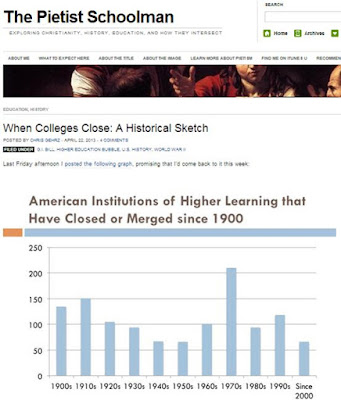Scanning higher education news and social media the last week or two feels a bit like it did back in March 2015 when Sweet Briar College announced it would close....of course, Sweet Briar is open and happily serving students. And in spite of many calls at the time that we were at a tipping point, it doesn't really feel like we are falling off a cliff.
Now in the first few weeks of 2019 we have seen a couple of small institutions announce they will close, another that faces possible loss of accreditation, and others are indicating that they are looking to merge or find a partner. As a result, we are once again seeing a number of people posting or commenting on what it all means...and from the sound of it, it isn't likely that it will be good.
Yet, in the flurry of recent articles, two people caught my attention this week with ideas that contrast with more common narratives.
Timothy Burke, professor of history at Swarthmore offers interesting reflections in "College of Theseus," on his Easily Distracted blog. Burke provides brief historical sketches of Newbury College, Hampshire College, and Green Mountain College after their recent announcements and the reactions he was viewing in the media.
In contrast to those who take each of these cases and jump to conclusions about what they imply for all of higher education, Burke argues that "...when you look at the story of any particular closure, they all have some important particulars. The story being told that flatters the disruptors and innovators would have us thinking that there are these venerable, traditional, basically successful institutions going about their business and then suddenly, ZANG, the future lands on them and they can’t survive. At least some of the institutions closing have been hustling or struggling or rebranding for their entire existence."
Similarly, I noticed that John Newsom, a reporter for the Greensboro News & Record, has been pushing back a bit in social media on the quick takes that possible loss of accreditation for Bennett College will automatically lead to closure.
Similarly, I noticed that John Newsom, a reporter for the Greensboro News & Record, has been pushing back a bit in social media on the quick takes that possible loss of accreditation for Bennett College will automatically lead to closure.
Newsom is doing really good reporting on the situation for his newspaper. He recently noted "...shortly after word got out that Bennett College could lose its accreditation, several folks asked me if they thought the private women’s school would close. A month ago, I said I didn’t know. Now, I’m going with probably not. It’s really, really hard to shut down a college, and Bennett is putting up a heck of a fight." His article presents several options for Bennett that would allow it to continue its mission.
For those interested I have been updating a file on Google Sheets for College Closures since 2009.
It is far too easy to hear that a college is closing and then jump to conclusions about a trend as Burke notes in his post. Historical perspective is always valuable and before we all conclude that the sky is falling, it is important to remember that a few colleges close every year.
While it is obviously early in the year and we may in fact see a surge of closures in 2019, our peak number of closures over the last decade was in 2016 and the numbers declined in each of the past two years.

For a longer perspective, Chris Gehrz, professor of history at Bethel University in St. Paul, Minnesota authored a couple of posts several years ago that explore data on institutional closures and found that closures peaked during the 1970s.



Article from Inside Higher Ed on March 27, 2019 focuses on TRACS accreditation of some smaller institutions, Struggling College Shops for New Accreditation: Bennett College, to keep its accreditation and access to federal aid, follows a playbook used by other small religious colleges.
ReplyDeleteInteresting article by Derek Newton for Forbes on March 27, 2019, Think Nonprofit Colleges Will Fail? Don't Bet On It.
ReplyDelete